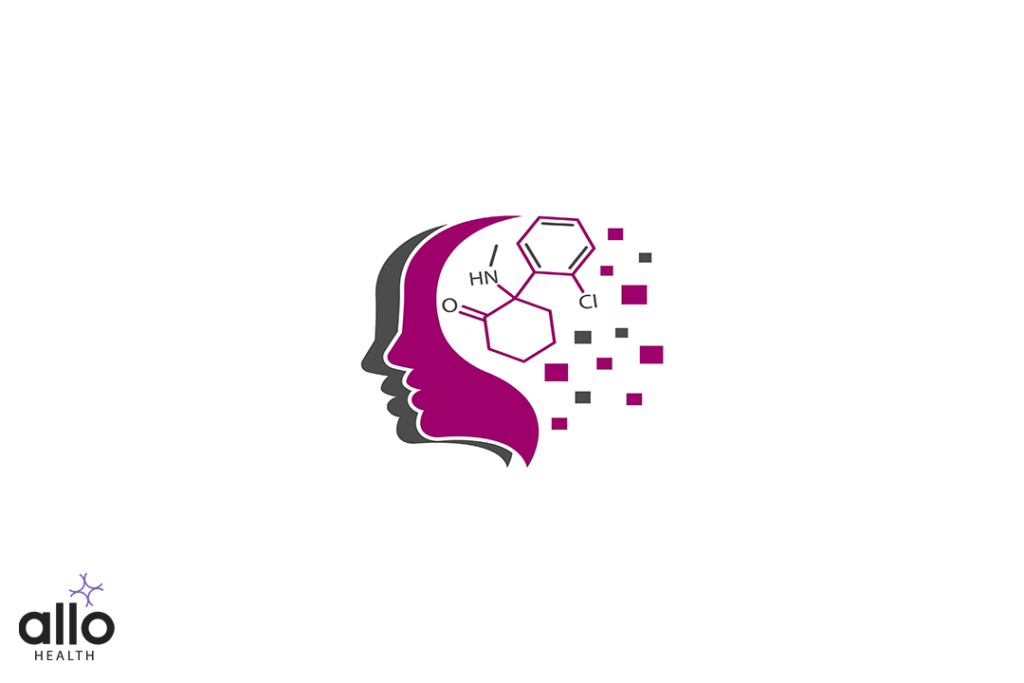Ketamine Addiction And Sexual Dysfunction

Allo Health is dedicated to personalized well-being, offering support and trusted information tailored to individual health goals. The platform emphasizes human-generated content, led by a distinguished medical team of experts, including physicians and sexual health specialists. Their commitment to credibility involves rigorous fact-checking, authoritative research, and continuous updates to ensure accurate, up-to-date information. Allo Health's unique approach goes beyond conventional platforms, providing expert-led insights and a continuous commitment to excellence, with user feedback playing a crucial role in shaping the platform's authoritative voice.

An early career psychiatrist with extensive experience in general adult psychiatry, relationship issues, psychosexual problems & special interest in sexual medicine, disorders with addictive behaviours and Obsessive Compulsive disorders. He is an astute physician with excellent academic record and research experience. He is also a member of World Health Organisation and World Psychiatric Association. His vision and goal for Allo is an inclusive, accessible digital health clinic for psychosexual difficulties.
Why This Was Upated?
Our experts continually monitor the health and wellness space, and we update our articles when new information became available.
Updated on 04 June, 2024
- Article was updated as part of our commitment to diversity, equity, and inclusion.

"The following blog article provides general information and insights on various topics. However, it is important to note that the information presented is not intended as professional advice in any specific field or area. The content of this blog is for general educational and informational purposes only.
Book consultation
The content should not be interpreted as endorsement, recommendation, or guarantee of any product, service, or information mentioned. Readers are solely responsible for the decisions and actions they take based on the information provided in this blog. It is essential to exercise individual judgment, critical thinking, and personal responsibility when applying or implementing any information or suggestions discussed in the blog."
Ketamine is a powerful dissociative anesthetic and sedative medication that is often used in medical settings to induce loss of consciousness. Doses of Ketamine are used for procedures such as surgery and diagnostic tests. However, it is also a commonly abused recreational drug, and individuals who use it recreationally may develop an addiction to it.
An addiction can occur when an individual starts using the drug recreationally and continues to use it despite negative consequences. These negative consequences may include concerns with work or school, financial difficulties, and relationship concerns.
Note: Males and females may differ in their response to ketamine.
Additionally, the physical and psychological side effects of ketamine include hallucinations, paranoia, and confusion.
One of the most significant dangers of an addiction to this anesthetic is that it can lead to a phenomenon known as “K-hole” or a dissociative state where users may lose touch with reality and experience hallucinations and delusions. This state can be very distressing and may lead to accidents or injuries.
Treatment for ketamine addiction typically includes a combination of therapy and medication. Therapy can help individuals understand their addiction and develop the skills they need to overcome it. Medications such as antidepressants and antipsychotics may also be used to help individuals manage the symptoms of addiction.
Can Ketamine Addiction Cause Sexual Dysfunction?
Ketamine works by binding to specific receptors in the brain and altering the way that the brain processes information. This can lead to a range of effects, including hallucinations, confusion, and dissociation. However, it can also affect a person’s sexual function.
There have been several studies that have looked at the link between ketamine use and sexual dysfunction. One study published in the Journal of Sexual Medicine found that men who used ketamine regularly were more likely to experience erectile dysfunction and decreased libido compared to those who did not use the drug.
Another study found that women who used ketamine were more likely to experience reduced sexual desire and difficulty achieving orgasm.
The exact mechanism by which the anesthetic causes sexual dysfunction is not entirely understood. However, it is thought that the drug’s effects on the brain’s dopamine and serotonin systems may play a role. Dopamine and serotonin are important neurotransmitters that regulate mood, motivation, and sexual function.
While ketamine addiction can cause sexual dysfunction, the dysfunction may be reversible if one stops using the drug and seek therapy. It’s important to use the drug only under the guidance of a medical professional and never use it recreationally.
Risk Factors
- One of the main risk factors for long-term ketamine abuse is the drug’s ability to cause dissociation, or a sense of detachment from one’s surroundings and self. This can lead to a feeling of euphoria and can make it easy for users to become addicted to the drug.
- Another risk factor is the drug’s ability to cause hallucinations and delusions (distorted perceptions), which can lead to users experiencing confusion, paranoia, and other mental health concerns. Long-term use can also lead to bladder and urinary tract concerns, as well as cognitive impairment.
- Additionally, ketamine is often obtained illegally, which means that users may be exposing themselves to additional risks such as violence, arrest, and exposure to other dangerous drugs.
- Those who struggle with mental health concerns, such as depression and anxiety, are also at a higher risk of addiction. As the drug can provide temporary relief from symptoms, this can make it difficult for those individuals to stop using the drug, even if it is causing harm.
How Does Ketamine Affect The Body?

Pain Relief Effects
One of the primary effects of ketamine on the body is pain relief. Because of its ability to block certain receptors in the brain, it can be used to relieve pain in conditions such as chronic pain, neuropathic pain, and postoperative pain. Additionally, it can also be used as an adjunct to other anesthetic medications to improve their effectiveness.
Heart & Blood Pressure Effects
Another addition to the effects on the body is an increase in heart rate and blood pressure. This can be dangerous for people with certain heart or blood pressure conditions, and so it is important to monitor these vital signs closely when administering ketamine.
Respiratory System Effects
Ketamine can also affect the respiratory system, causing changes in breathing rate and depth. This can be particularly dangerous for people with respiratory conditions, and so it is important to monitor breathing closely when administering ketamine.
Cognitive Effects
Ketamine also has a number of cognitive effects, including hallucinations and delusions. These effects are usually temporary and occur only when the drug is administered at high doses. However, they can be disturbing and can lead to confusion and disorientation.
Mental Health Disorder Treatment
Ketamine has been used as a treatment for depression and PTSD, and it has shown to have fast-acting and long-lasting effects in reducing symptoms of these conditions.
Sexual Disorders
While it can produce a variety of effects, including hallucinations and euphoria, long-term ketamine abuse can also lead to a number of sexual disorders.
Erectile Dysfunction
This occurs when a person is unable to get or maintain an erection, and can be caused by a variety of factors, including damage to the blood vessels or nerves in the penis. In addition, ketamine addiction can also lead to decreased libido, or a lack of sexual desire, as well as difficulty reaching orgasm.
Premature Ejaculation
Another sexual disorder that can be caused by ketamine addiction is premature ejaculation. This occurs when a person ejaculates before they or their partner would like, and can be caused by a variety of factors, including psychological concerns, such as anxiety or depressive symptoms, or physical concerns, such as nerve damage.
Additionally, ketamine addiction can also lead to a number of other sexual disorders, such as difficulty getting or maintaining an erection, difficulty reaching orgasm, and painful intercourse.
Mental Health Disorders
Ketamine has also been used recreationally as a party drug, and long-term administration can lead to addiction and a host of mental health disorders.
Dissociative Amnesia
One of the most common mental health disorders caused by long-term abuse is dissociative amnesia, which is characterized by memory loss and difficulty recalling past events. This can be particularly problematic for individuals who have a history of trauma, as ketamine use may trigger traumatic memories and exacerbate symptoms of post-traumatic stress disorder (PTSD).
Depression & Anxiety
The drug’s ability to dissociate users from their surroundings can cause them to feel detached from reality, leading to feelings of hopelessness and despair. Additionally, ketamine use can disrupt the balance of chemicals in the brain, leading to an imbalance of neurotransmitters that can contribute to mood disorders.
Psychosis
Long-term abuse can cause hallucinations, delusions, and other symptoms of psychosis, which can be difficult to distinguish from those caused by other mental health disorders. In severe cases, ketamine psychosis can lead to permanent damage to cognitive function.
While ketamine addiction can cause serious mental health disorders, these disorders can also be caused by other factors such as genetic predisposition, trauma, and life events.
Major Organs & Systems Negatively Affected
Chronic use of ketamine can have serious negative effects on a person’s physical and mental health, including damage to several major organs.
Urinary Tract System
Long-term ketamine use can lead to chronic bladder pain and inflammation, as well as ulcerative cystitis, a severe and potentially debilitating condition that can cause chronic pain, frequent urination, and even incontinence.
Urinary tract symptoms
- Frequent urination: This can occur as a result of the drug’s diuretic effects, which increase the amount of urine produced by the body. This can lead to a constant urge to urinate, even if there is little or no urine to be expelled.
- Difficulty urinating: This can occur due to muscle spasms in the urinary tract, which can make it difficult to empty the bladder fully. This can lead to a feeling of incomplete emptying and the need to urinate more frequently.
- Painful urination: This can be caused by inflammation or irritation of the urinary tract, and can range from a mild burning sensation to severe pain.
- Blood in the urine (Hematuria): This can be caused by damage to the urinary tract or kidneys, and should be treated as a medical emergency.
- Urinary incontinence (Unintentional loss of urine): This can occur due to the weakening of the muscles that control urination, which can make it difficult to hold urine in the bladder.
Treatment for urinary tract symptoms of this addiction typically involves addressing the underlying addiction. This can include behavioral therapy, counseling, and medication-assisted treatment. In some cases, surgery may be necessary to repair any damage caused to the urinary tract or kidneys.
Liver
Long term effects of abuse can also damange the liver – the drug is metabolized by the liver, and chronic use can lead to liver damage and even liver failure. This is because ketamine causes a buildup of toxins in the liver, which can lead to inflammation, scarring, and damage to the liver cells.
Brain Damages
One of the most significant consequences is the damage it can cause to the prefrontal cortex of the brain. The prefrontal cortex is a critical part of the brain that is responsible for a wide range of functions, including decision-making, planning, problem-solving, and impulse control. It is also involved in regulating emotions and social behavior.
When a person becomes addicted to ketamine, they experience a significant alteration in the normal functioning of the prefrontal cortex. This can lead to a variety of cognitive and behavioral concerns, including:
- Impairment in decision-making and planning: The damage to the prefrontal cortex caused by ketamine addiction can make it difficult for a person to make good decisions and plan for the future.
- Problem-solving difficulties: The prefrontal cortex is also responsible for problem-solving, and addiction to ketamine can make it harder for a person to think through complex problems and find solutions.
- Loss of impulse control: The prefrontal cortex plays a critical role in regulating impulse control, and an addiction can make it harder for a person to resist temptations and make good choices.
- Emotional and social concerns: The prefrontal cortex is also involved in regulating emotions and social behavior, and addiction to ketamine can make it harder for a person to control their emotions and interact with others in a healthy way.
Furthermore, long-term administration can lead to addiction and serious consequences on brain volume. Studies have shown that chronic ketamine abuse can lead to a reduction in gray matter volume in the brain. Gray matter is responsible for processing information, and a reduction in gray matter volume can lead to cognitive impairment, memory loss, and difficulty with problem-solving and decision making.
White matter is responsible for connecting different regions of the brain and facilitating communication between them. Damage to white matter can lead to disruptions in communication between different regions of the brain, which can further contribute to cognitive impairment.
Cardiovascular System
One of the most significant influence of ketamine addiction on the cardiovascular system is an increase in blood pressure. The drug causes the blood vessels to constrict, which can lead to hypertension and an increased risk of heart attack or stroke. Additionally, ketamine can cause irregular heartbeats and even heart failure.
Another consequence of ketamine addiction is damage to the heart muscle. Long-term ketamine administration can lead to cardiomyopathy, a condition in which the heart muscle becomes weakened and unable to pump blood effectively. This can lead to heart failure and other serious complications.
Long-term ketamine abuse can also lead to changes in the structure and function of the blood vessels. The drug can cause the blood vessels to become damaged and narrowed, which can lead to reduced blood flow to the heart and other organs. This can also increase the risk factors for heart attack or stroke.
Key Takeaways
- Ketamine addiction can lead to negative consequences such as work or school problems, financial difficulties, and relationship concerns.
- It may cause sexual dysfunction, including erectile dysfunction and decreased libido, in both men and women.
- Ketamine abuse can lead to dissociative effects and hallucinations, including a phenomenon known as “K-hole.”
- Long-term ketamine use can result in physical health issues, such as bladder pain, inflammation, and ulcerative cystitis.
- The drug can damage major organs, including the liver and cardiovascular system, leading to heart failure, irregular heartbeats, and hypertension.
- Chronic ketamine abuse can also cause cognitive impairment, affecting decision-making, problem-solving, and memory functions.
Frequently Asked Questions
Q: What are the uses of ketamine in treatment resistant depression?
A: Ketamine for depression treatment helps provide rapid relief from depressive symptoms and improve mood (antidepressant-like effects). It has shown promise in cases where traditional antidepressant medications have been ineffective.
Q: Is ketamine the date-rape drug?
A: Yes, ketamine is sometimes referred to as the “date-rape drug” due to its ability to cause sedation and dissociation, which can be used to incapacitate someone without their consent in a sexual assault. However, it is essential to note that any use of ketamine for such purposes is illegal and highly unethical.
Q: Does ketamine cause psychotomimetic side effects?
A: Yes, ketamine can cause psychotomimetic side effects, including hallucinations, delusions, and altered perceptions of reality, especially when used at high doses or in recreational settings. These dissociative side effects are temporary and typically subside as the drug’s effects wear off.
Q: What are the effects of drug addiction?
A: Drug addiction can have a wide range of effects, including physical health deterioration, mental health issues, strained relationships, financial problems, and legal troubles. It can significantly impact an individual’s overall well-being and quality of life.












































